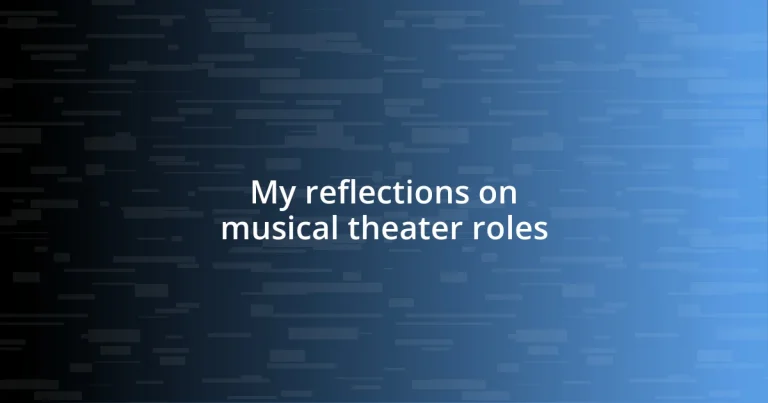Key takeaways:
- Character preparation deeply impacts emotional authenticity, collaboration, and adaptability in musical theater performances.
- Engaging in various techniques, like method acting and backstory development, enriches character portrayal and enhances performer experiences.
- Connecting personal experiences with characters can lead to personal growth, making performances more relatable and impactful for both actors and audiences.
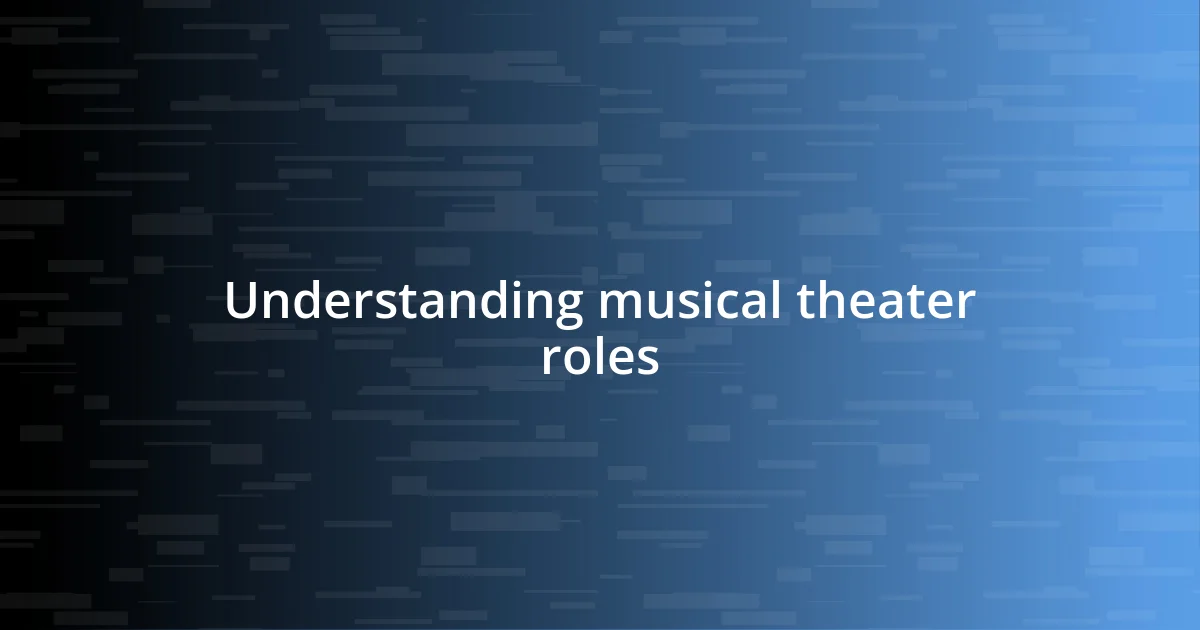
Understanding musical theater roles
Understanding musical theater roles is like peeling back the layers of a complex onion. Each character brings a unique blend of emotion and story that resonates with both the performer and the audience. I remember the first time I took on a challenging role; the laughter and tears felt genuine, and I found myself reflecting on what it truly means to convey emotions through song and performance.
Have you ever thought about how roles in musical theater can serve as mirrors of our own experiences? Whether portraying a hero or a villain, I’ve learned that delving deeper into a character’s motivations often leads to personal growth. There’s something transformative about stepping into another’s shoes, allowing you to explore different facets of your own identity.
In my experience, the richness of musical theater roles lies not just in the performance but in the collaborative effort with fellow actors. I recall a rehearsal where we worked on a duet; the harmony we created wasn’t just musical but emotional. This synergy can elevate performances, making them feel authentic and relatable to the audience. Isn’t it fascinating how these roles create a unique space for connection and expression?
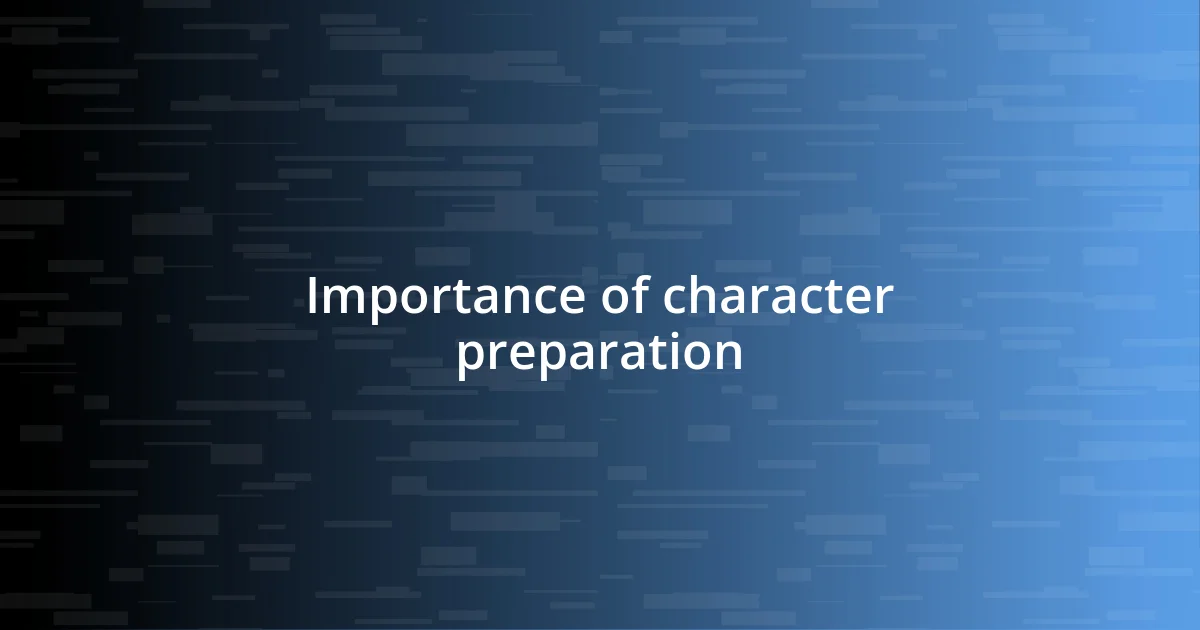
Importance of character preparation
Character preparation is crucial in musical theater, as it allows performers to fully embody their roles. I remember preparing for a role where I had to tap into deep-seated emotions of loss and regret. Taking the time to understand the character’s backstory helped me portray those feelings authentically, which was evident in the audience’s reaction. When you invest in preparation, it creates a ripple effect, enhancing the overall performance.
Furthermore, I’ve found that thorough character preparation fosters a natural rapport with other cast members. In one production, I worked closely with a fellow actor to build our characters’ relationship, spending time outside of rehearsals discussing our motivations. This extra effort translated into a more believable and engaging performance, making our interactions feel organic. It’s amazing how this practice prepares you not just for your role, but for collaborating with others as well.
Lastly, character preparation also equips performers with the tools needed for adaptability. In a recent show, the director decided to shift the tone of a scene during rehearsals. Because I had a solid grasp of my character, I instinctively adjusted my performance to suit the new direction. This ability to pivot enhances the fluidity of a production and demonstrates the importance of being well-prepared.
| Aspect | Importance of Character Preparation |
|---|---|
| Emotional Depth | Enables authentic connection with audience |
| Collaboration | Fosters stronger bonds with fellow actors |
| Adaptability | Prepares performers for changes in direction |

Techniques for building a character
Building a character in musical theater requires a combination of techniques that help deepen the portrayal. One technique I’ve found invaluable is method acting, which involves immersing oneself in the character’s mindset and experiences. For example, during a particularly intense scene, I spent time alone in silence, reflecting on my character’s struggles. This silence allowed me to channel emotions and bring authenticity to my performance that resonated with my fellow cast members and the audience alike.
To build a character effectively, consider these techniques:
– Backstory Development: Create a detailed history for your character. This adds depth and informs how they react to situations.
– Emotional Memory: Tap into your own feelings and memories to evoke the required emotions for your character.
– Body Language: Experiment with different physical traits or movements that align with your character’s personality.
– Vocal Techniques: Adjust your voice to reflect the character’s experience, age, and emotion, which can lend credibility to your portrayal.
– Improvisation Exercises: Engage in exercises that push you to react as the character would in various scenarios, helping you discover aspects of their personality.
I’ve learned that these techniques not only enhance the character I’m portraying but also enrich my overall experience as a performer. When I truly connect with the character, I feel an electric energy during performances that can’t be replicated. It’s in these moments of truth that I believe the magic of musical theater truly shines.

Analyzing iconic musical theater roles
Examining iconic musical theater roles often reveals how they resonate deeply with both performers and audiences. For instance, I once played the role of Jean Valjean in Les Misérables, and the sheer weight of his journey—redemption after a lifetime of struggle—taught me so much about resilience. I remember standing in the wings, feeling the anticipation build, and I couldn’t help but think, “How can I honor this character’s complexities in those few moments on stage?”
Another role that left an indelible mark on my heart was Amber Von Tussle in Hairspray. Her vibrant, yet superficial nature was a stark contrast to my own personality—what a challenge! I discovered that allowing myself to tap into my own insecurities and exaggerate them was key to portraying her authentically. Has there ever been a character that felt completely foreign to you, yet after digging deeper, you found a piece of yourself within them?
Looking closely at these characters, I also noticed how their arcs serve as mirrors reflecting societal issues and personal growth. For instance, Elphaba in Wicked embodies the struggle against prejudice and finding one’s voice. During my portrayal, I found myself contemplating how many of us suppress our true selves out of fear of rejection. This engagement with the role ignited a passionate response in the audience that made every performance feel like a shared journey. Doesn’t it just strike you how, through these iconic roles, we not only tell stories but also connect with shared human experiences?
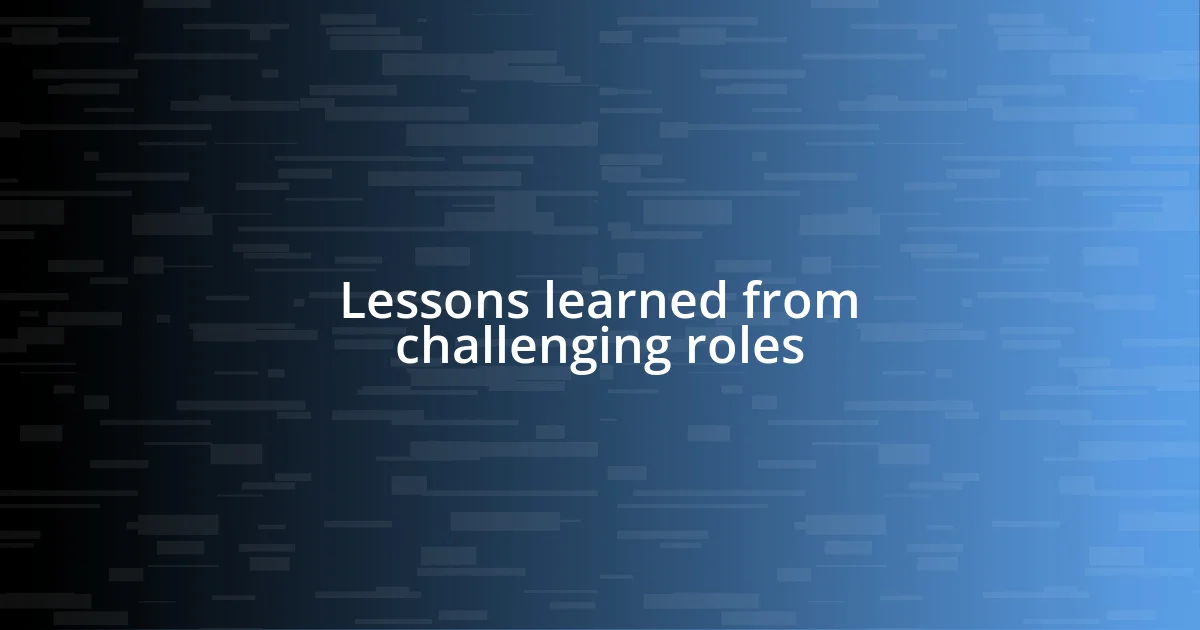
Lessons learned from challenging roles
Challenging roles have a funny way of teaching us lessons we didn’t know we needed. I remember grappling with the character of Brynne in a lesser-known musical, whose turbulent emotions pushed me to explore vulnerability. I found that by embracing those raw feelings, not only did my performance improve, but I also learned to express my own emotions more freely offstage. Isn’t it fascinating how art can reflect our personal growth?
One thing I’ve discovered through tough roles is the importance of teamwork. During a production where I played Edna Turnblad in Hairspray, the ensemble truly became my backbone. There were scenes where I felt overwhelmed, but seeing my castmates rally around me made all the difference. Have you ever experienced that sense of support while collaborating with others? It’s a reminder that we are all in this together, each helping to lift each other’s performances.
Another powerful lesson from these roles is the concept of growth through discomfort. In taking on the complex dynamics of a villain, I wrestled with feelings of unease trying to tap into motives that felt alien to me. Yet, stepping outside of my comfort zone helped me appreciate the multifaceted nature of humanity itself. Reflecting on those experiences emphasizes the idea that sometimes, the biggest transformations occur when we face our insecurities head-on. What if, instead of shying away from those difficult portrayals, we welcomed them as opportunities for self-discovery?
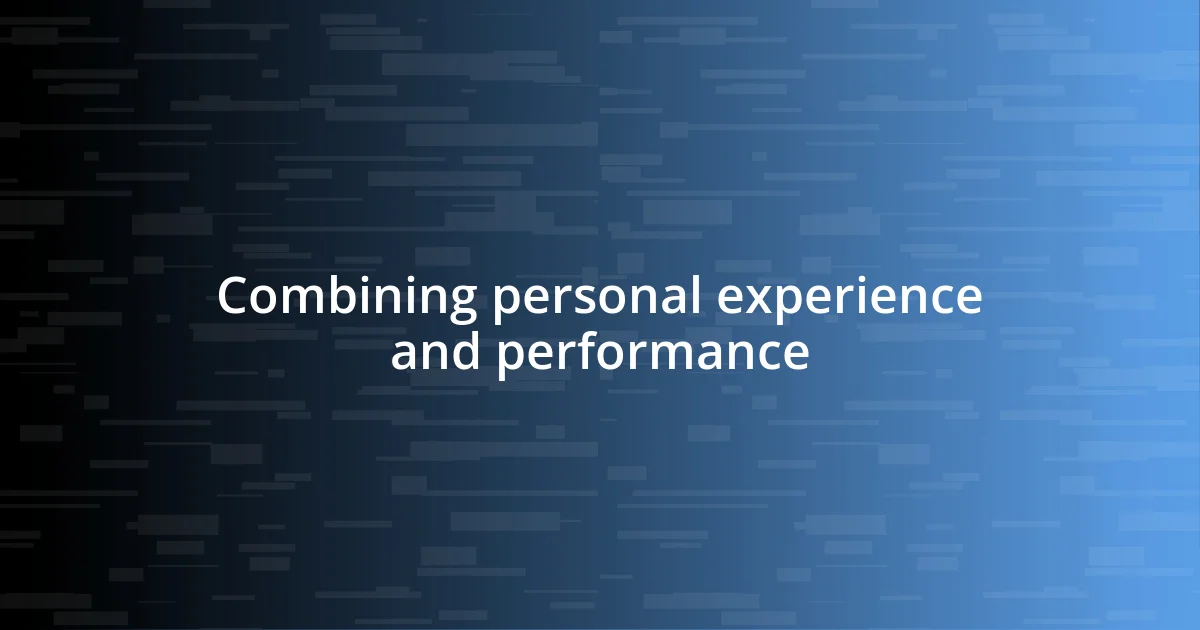
Combining personal experience and performance
I’ve often found that merging my personal experiences with theatrical performances enriches both my craft and my understanding of self. When I took on the role of Sandy in Grease, I was surprised to realize how much I resonated with her journey of transformation. Reflecting on my own experiences of navigating different social spheres, I learned that portraying her required me to embrace both vulnerability and confidence, mirroring my own evolution during that time. Have you ever connected so deeply with a character that it forced you to reconsider your own life?
The beauty of musical theater lies in its power to act as a vehicle for personal storytelling. I remember stepping into the shoes of Mimi from Rent, grappling with her struggles and desires. As I delved into the nuances of her world, I found myself recalling the challenges I faced in my youth, from the pressure to fit in to the yearning for authenticity. This connection brought a more profound depth to my performance—have you felt that spark of recognition when embracing a character’s journey onstage?
Sometimes, it’s those awkward moments offstage that teach us the most about our roles. During a rehearsal for Wicked, I flubbed a line and let out a nervous laugh, which suddenly broke the tension in the room. That moment helped me appreciate the importance of spontaneity in both life and performance. It became clear to me that our shared humanity shines brightest when we allow ourselves to be imperfect. Don’t you find it refreshing when a performance feels real, complete with its beautiful messiness?












